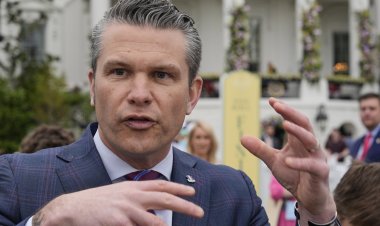Schumer launches new phase in push for AI bill
The Senate majority leader’s “SAFE Innovation framework” sketches out a rough legislative plan on AI — and suggests tech companies could get goodies as well as guardrails from Congress.

Senate Majority Leader Chuck Schumer unveiled his framework Wednesday to get Congress on a path toward comprehensive AI legislation — though any specific legislative details remain murky.
The majority leader’s “SAFE Innovation framework” builds on his April announcement of a “major effort” to develop federal regulations for AI. According to a one-pager from Schumer’s office, the acronym stands for security, accountability, foundations and explain, which together make up four of the five principles underpinning Schumer’s legislative approach to the fast-moving technology.
“Many want to ignore AI because it’s so complex,” Schumer said in a speech at the Center for Strategic and International Studies think tank, where he announced the new framework. “But when it comes to AI, we cannot be ostriches sticking our heads in the sand.”
Schumer expects comprehensive AI legislation will secure both U.S. national security and American jobs; support responsible systems in the areas of misinformation, bias, copyright, liability and intellectual property; require AI tools to align with democratic values; and determine what level of transparency the federal government and private citizens require from AI companies.
The fifth principle, innovation, builds off the majority leader’s desire to “support U.S.-led innovation in AI technologies.” Lawmakers are mulling whether to fund research projects and compute infrastructure that could supercharge productivity and help American AI companies compete with foreign rivals.
“Innovation must be our North Star,” Schumer said Wednesday. “But if people think AI innovation is not done safely, if there are not adequate guardrails in place ... that will stifle or even halt innovation altogether.”
Schumer also announced plans to convene a series of “AI Insight Forums" starting this fall. The meetings would task top AI experts with briefing Congress on topics as varied as workforce, national security, privacy, explainability and even “doomsday scenarios.”
Schumer said the forums are meant to shake Congress free from its slow-moving committee process in order to regulate the fast-moving technology.
“There’s such little legislative history on this issue, so a new process is called for,” Schumer said. The majority leader later warned that if lawmakers take “the typical path — holding congressional hearings with opening statements and each member asking questions five minutes at a time, often on different issues — we simply won’t be able to come up with the right policies.”
But the forums aren’t expected to start until September. And even if Congress can bridge a substantial knowledge gap, an approaching presidential election means there’s likely a limited time window for lawmakers to work together on sweeping legislation.
In a brief Q&A session at the conclusion of his speech, Schumer said his office had reviewed the European Union’s AI Act and other foreign efforts to rein in the industry, and found that none “have really captured the imagination of the world.”
“Our goal is to come up with an American proposal,” said Schumer, who described the U.S. as “the largest economy in the world, innovative leader in the world, the intellectual leader in the world.” He added that most other countries would prefer to see one system to regulate AI.
“If we can put this together in a very serious way, I think the rest of the world will follow,” Schumer said.
Schumer said any wide-ranging AI bills must be bipartisan. He touted ongoing efforts to build an alliance between Sens. Mike Rounds (R-S.D.), Todd Young (R-Ind.) and Martin Heinrich (D-N.M.), but said the path ahead remains rocky.
“No question about it: This is all exceedingly ambitious,” Schumer said Wednesday. “We must exercise humility as we proceed. We are going to work very hard to come up with comprehensive legislation.”











